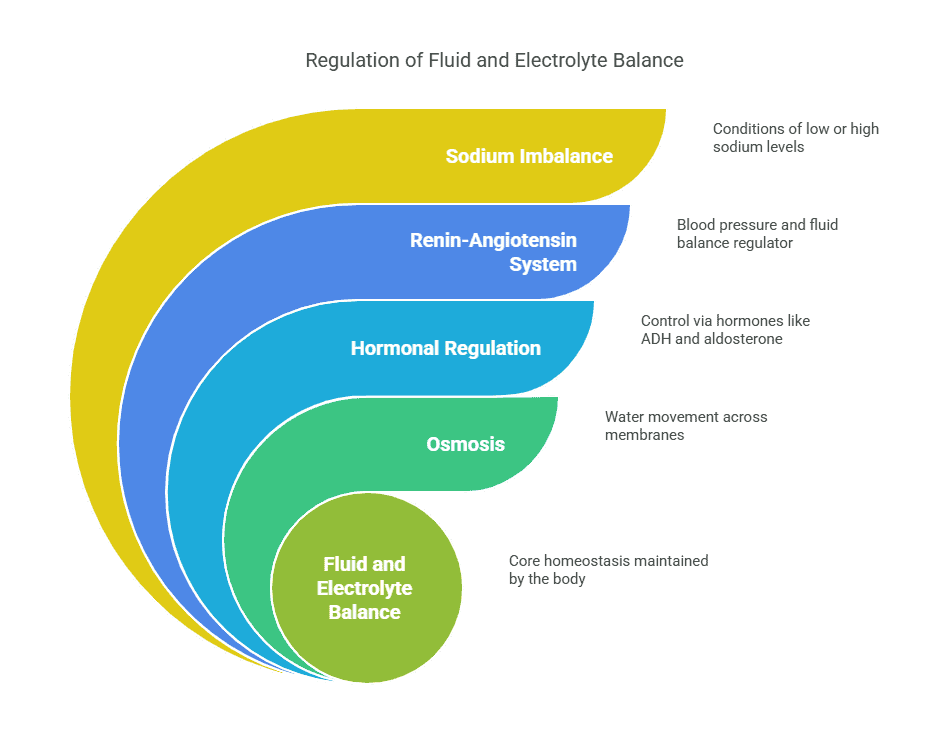Our body is made up of approximately 60% water, which plays a crucial role in maintaining various bodily functions. The urinary system, consisting of the kidneys, ureters, bladder, and urethra, is responsible for regulating the balance of fluids and electrolytes in the body. Fluid and electrolyte balance is essential for the proper functioning of cells, tissues, and organs.
Fluid Balance
Fluid balance refers to the regulation of the amount of water in the body. The kidneys play a vital role in maintaining fluid balance by filtering the blood and excreting excess water as urine. When the body is dehydrated, the kidneys conserve water by producing concentrated urine. On the other hand, when the body has excess fluid, the kidneys excrete more urine to maintain the balance.
Electrolyte Balance
Electrolytes are minerals in the body that carry an electric charge and play a crucial role in various bodily functions. The main electrolytes include sodium, potassium, chloride, calcium, and magnesium. The kidneys help regulate the levels of electrolytes in the body by selectively reabsorbing or excreting them in the urine. Imbalances in electrolyte levels can lead to health problems such as muscle cramps, weakness, and irregular heart rhythms.
Regulation of Fluid and Electrolyte Balance
The kidneys regulate fluid and electrolyte balance through processes such as filtration, reabsorption, and secretion. Filtration occurs in the glomerulus, where blood is filtered to remove waste products and excess fluids. Reabsorption takes place in the renal tubules, where essential substances such as water and electrolytes are reabsorbed back into the bloodstream. Secretion involves the excretion of waste products and excess substances into the urine.
Summary
In summary, the urinary system plays a crucial role in regulating the balance of fluids and electrolytes in the body. Fluid balance is maintained by the kidneys through processes such as filtration and reabsorption, while electrolyte balance is regulated by selectively reabsorbing or excreting electrolytes. Imbalances in fluid and electrolyte levels can have serious consequences for health, underscoring the importance of proper regulation by the urinary system.
Key Takeaways:
- Fluid and electrolyte balance is crucial for maintaining homeostasis in the body
- The kidneys play a key role in regulating fluid and electrolyte balance
- Regulation of fluid balance is primarily controlled by hormones such as antidiuretic hormone (ADH) and aldosterone
- Electrolyte balance is regulated by the kidneys through processes such as reabsorption and secretion
- Imbalances in fluid and electrolyte balance can lead to serious health issues such as dehydration or electrolyte imbalances
- Monitoring and managing fluid and electrolyte balance is essential for overall health and wellbeing
Key Terms:
- Fluid balance: The state in which the body’s fluid intake equals its fluid output, maintaining homeostasis.
- Electrolyte balance: The state in which the body’s electrolyte intake equals its electrolyte output, maintaining homeostasis.
- Osmosis: The movement of water across a semipermeable membrane from an area of low solute concentration to an area of high solute concentration.
- Antidiuretic hormone (ADH): A hormone released by the pituitary gland that regulates the reabsorption of water in the kidneys.
- Aldosterone: A hormone released by the adrenal glands that regulates the reabsorption of sodium and water in the kidneys.
- Renin-angiotensin system: A hormonal system that regulates blood pressure and fluid balance by controlling the production of aldosterone.
- Hyponatremia: A condition in which there is an abnormally low level of sodium in the blood.
- Hypernatremia: A condition in which there is an abnormally high level of sodium in the blood.
